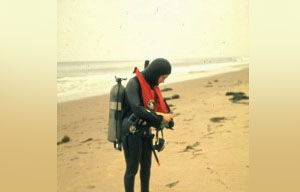This article is the continuation of this previous installment
Where confusion ensues
Since this article is about diver fitness, I will leave the skill development aspect to others more qualified than I am. I will focus instead on the fitness issues causing the most confusion in the diving community.
Many Divers forget the on-land demands
 They love being underwater so much they concentrate on water conditioning almost exclusively. Extended surface swimming, usually with snorkel and fins, are their attempts to become physically fit divers.
They love being underwater so much they concentrate on water conditioning almost exclusively. Extended surface swimming, usually with snorkel and fins, are their attempts to become physically fit divers.
The problem is that the demands during the actual dive (not immersion or ascent) are completely different. There’s nothing wrong with swimming and you will find it makes a great addition to an overall fitness program, but if you think it will make you a better diver by itself, you are missing the big picture. Don’t forget gear lacks motion. It is neutral underwater, but on the surface, you haul it. Those neglecting their strength training pay the price as they struggle with the weight of the gear and the variables of uneven terrain, rocking platforms, climbing ladders, and other situations.
Many Divers Mistake Leisure for Exercise
For all the hoopla about diving being exercise divers seem to forget the objective of diving is to exert as little physical effort as possible to extend gas supply. It’s all about efficiency. Moving in the water with the least amount of effort covering the greatest distance, or counteracting other actions with calmness is the hallmark of every skilled diver.
Does that mean that diving is useless as exercises? That depends! If all you want is a little bit of activity to get you off the couch, moving somewhat, and enjoying a great time with others, then it’s useful as an activity. But do not expect the benefits that come from a proper exercise program. The type of stimulus needed to elicit the physiological changes we crave from exercise require us to cross a zone. It is within anyone’s reach, but it requires a good investment of mental and physical discipline. If you are trying to achieve physical fitness, not only for diving, but also for activities on land, diving alone won’t cut it.
Many Divers focus too much on their cardio rather than strength
They want to get conditioned but have no idea how. They engage in frequent bouts of running, biking, or other means with the idea of developing cardiovascular conditioning without realizing cardiovascular work is an expression of strength training. Yes, cardiovascular work is nothing but several bouts of sub-maximal strength. The musculoskeletal system gets the heart working, not the other way around. The lower the strength capacity, the lower the endurance capacity.
Many Divers are not familiar with strength training
 When I suggest they start a strength program they usually reply with “I don’t want to get big” or “I’m not interested in lifting heavy.” Goes to show what the common biases are.
When I suggest they start a strength program they usually reply with “I don’t want to get big” or “I’m not interested in lifting heavy.” Goes to show what the common biases are.
It is important to realize that strength is our ability to overcome inertia, plain and simple. It has nothing to do with getting big or lifting heavy. While those could be specific results, the essence of strength training is to prepare the individual’s structure to deal with the demands imposed by gravity or activities.
Strength will be a great asset for the diver looking to be safer for himself and his team. Strength means greater capacity, self-sufficiency, greater impact on a team, and a greater chance of survival in stressful conditions. Combine that with skill and the result is a super diver enjoying many years of fun diving, keeping not only himself, but also his teammates safer.
Until Next Time!

